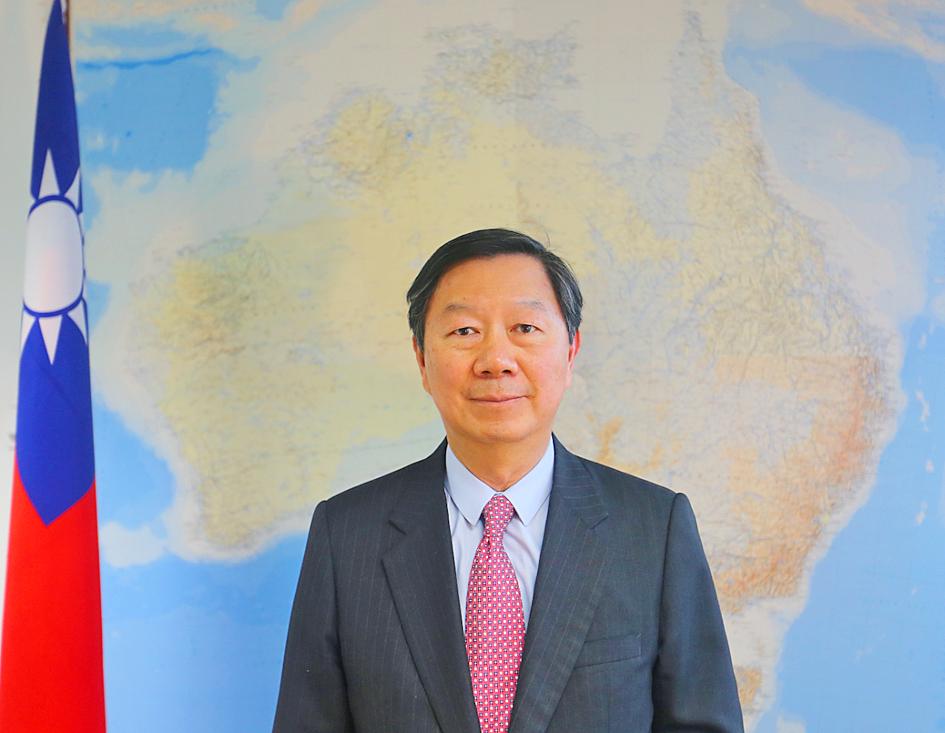A Taiwanese official has asked Australia to support its bid to join the Comprehensive and Progressive Agreement for Trans-Pacific Partnership (CPTPP) pact, saying Taiwan can boost high-technology trade flows and demand for Australian minerals.
Support for Taiwan’s bid would also “send a strong message” to Australian businesses affected by China’s boycotts of Australian products, Representative to Australia Elliott Charng (常以立) yesterday told a parliamentary committee in Canberra.
“Economic sanctions imposed on Australia by China reinforce the argument of engaging with Taiwan more closely and more deeply,” he told the committee.

Photo courtesy of Taipei Economic and Cultural Office in Australia
Each member of the 11-nation CPTPP has to approve new members and the committee will recommend Australia’s response.
The regional trade group, formed in 2018, includes Canada, Australia, Brunei, Chile, Japan, Malaysia, Mexico, New Zealand, Peru, Singapore and Vietnam. It has received applications from Britain, Taiwan and China to join. The bids by Taiwan and China in the past month have sparked tension, with Beijing opposing Taiwan’s application, and Taiwan accusing Beijing of bullying.
China is Australia’s largest trading partner, with exports reaching a record A$19.4 billion (US$14.3 billion) in July on the back of iron ore demand. However, diplomatic relations have soured in recent years.
Australia was Taiwan’s third-largest source of agricultural goods, worth US$607 million last year, and the CPTPP would provide structure to do business and enhance cybersecurity cooperation, Charng said.
“The opposition from China is not unexpected. China will use every way to avoid Taiwan participating in any international organizations,” he said.
China on Monday said it had lodged stern representations with Australia over “inappropriate” comments by former Australian prime minister Tony Abbott who last week visited Taiwan in a personal capacity and met Taiwanese President Tsai Ing-wen (蔡英文).
Abbott told reporters on Friday that Taiwan met the criteria for joining the CPTPP, but “fear of upsetting China” could cause some members to object to Taiwan’s application.
He urged countries to move beyond “rhetorical support” for Taiwan and provide practical support.
China has also lobbied the Australian parliament committee to help it join the CPTPP, describing the strength of Chinese trade with Australia and avoiding mention of billions of dollars in punitive sanctions imposed by Beijing.

GROWING OWINGS: While Luxembourg and China swapped the top three spots, the US continued to be the largest exposure for Taiwan for the 41st consecutive quarter The US remained the largest debtor nation to Taiwan’s banking sector for the 41st consecutive quarter at the end of September, after local banks’ exposure to the US market rose more than 2 percent from three months earlier, the central bank said. Exposure to the US increased to US$198.896 billion, up US$4.026 billion, or 2.07 percent, from US$194.87 billion in the previous quarter, data released by the central bank showed on Friday. Of the increase, about US$1.4 billion came from banks’ investments in securitized products and interbank loans in the US, while another US$2.6 billion stemmed from trust assets, including mutual funds,

Micron Memory Taiwan Co (台灣美光), a subsidiary of US memorychip maker Micron Technology Inc, has been granted a NT$4.7 billion (US$149.5 million) subsidy under the Ministry of Economic Affairs A+ Corporate Innovation and R&D Enhancement program, the ministry said yesterday. The US memorychip maker’s program aims to back the development of high-performance and high-bandwidth memory chips with a total budget of NT$11.75 billion, the ministry said. Aside from the government funding, Micron is to inject the remaining investment of NT$7.06 billion as the company applied to participate the government’s Global Innovation Partnership Program to deepen technology cooperation, a ministry official told the

Taiwan Semiconductor Manufacturing Co (TSMC, 台積電), the world’s leading advanced chipmaker, officially began volume production of its 2-nanometer chips in the fourth quarter of this year, according to a recent update on the company’s Web site. The low-key announcement confirms that TSMC, the go-to chipmaker for artificial intelligence (AI) hardware providers Nvidia Corp and iPhone maker Apple Inc, met its original roadmap for the next-generation technology. Production is currently centered at Fab 22 in Kaohsiung, utilizing the company’s first-generation nanosheet transistor technology. The new architecture achieves “full-node strides in performance and power consumption,” TSMC said. The company described the 2nm process as

JOINT EFFORTS: MediaTek would partner with Denso to develop custom chips to support the car-part specialist company’s driver-assist systems in an expanding market MediaTek Inc (聯發科), the world’s largest mobile phone chip designer, yesterday said it is working closely with Japan’s Denso Corp to build a custom automotive system-on-chip (SoC) solution tailored for advanced driver-assistance systems and cockpit systems, adding another customer to its new application-specific IC (ASIC) business. This effort merges Denso’s automotive-grade safety expertise and deep vehicle integration with MediaTek’s technologies cultivated through the development of Media- Tek’s Dimensity AX, leveraging efficient, high-performance SoCs and artificial intelligence (AI) capabilities to offer a scalable, production-ready platform for next-generation driver assistance, the company said in a statement yesterday. “Through this collaboration, we are bringing two